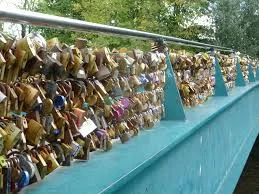
Derbyshire has been making national headlines again, this time because the local authority has announced it will remove the many thousands of padlocks lovingly secured to a bridge in Bakewell. While the locks are divisive the decision has been a PR faux pas, writes Sarah Newton.
Do you adore the locks or think there’s a better way of expressing your love?
FOR decades the most famous thing to come out of Bakewell was the pudding. Not the tart, as any Derbyshire resident will tell you, but the pudding with its buttery puff pastry case, filled with a layer of seedless strawberry jam and finished with soft egg custard and a smattering of almonds.
But this month, the Peak District town has been making national headlines because council officials have announced plans to remove the thousands of love locks that have been fastened to the Wye Bridge over the last 12 years.
The locks have been attached to the bridge by locals and tourists to remember lost loved ones or celebrate their love and they have become such an attraction the landmark has been renamed, not that imaginatively, Love Lock Bridge.
But what began as a few scattered tokens of love has burgeoned into a metallic mosaic, posing potential safety hazards. In fact, engineers have warned, the weight of the locks, which multiply daily, places an increasing strain on the bridge’s structure.
So, in its wisdom, the council announced that they would be removed on September 16 and people have been invited to remove their locks before then – if they don’t want them melted down.
The suggestion has left some people devastated with news sites reporting heartbreaking stories of locks that had been left in memory of still born babies, dying relatives and by couples who have returned to the town every year to find their lock and celebrate their anniversary.
It’s true that the aesthetic appeal of the love locks is a matter of personal taste. While some consider them to be a charming testament to romance, others see them as unsightly clutter that detract from the location’s natural beauty.
On a recent trip to Paris, I was staggered by the number of locks attached to railings around tourist spots such as Montmartre, with street sellers hawking cheap locks on every corner.
And the problem is a worldwide issue; in New York 11,000 locks were removed from Brooklyn Bridge, while authorities in Melbourne removed 20,000 locks from the Evan Walker Bridge.
But Bakewell isn’t a metropolis and you can’t help wonder if the whole thing could have been handled a little bit better. From a PR perspective, Bakewell has never been so well publicised, it’s just not for the right reasons.
The authorities have been left looking mean-spirited and cold-hearted and perhaps the council could have taken a more thoughtful, community-focussed approach which honours the spirit of the tradition while safeguarding the bridge and the natural environment for future generations.
Surely the locks could be removed without the need for industrial cutters and perhaps they could have been relocated to a specifically designated area – perhaps creating a piece of interactive art that can grow and evolve with the addition of every padlock.
Instead a tourist attraction which has given Bakewell something in common with Venice – the Rialto Bridge had the same issue – is being dismantled and no matter how powerful a love story is, it’s never going to be as strong as the council’s bolt cutters.
More than 1,300 people have joined a Facebook page dedicated to preserving Love Lock Bridge and national news outlets including the Daily Mail, The Independent and the BBC have reported on the distress felt by those who left what they thought was a permanent declaration of their enduring love on the Derbyshire landmark.
But a tone deaf decision from the council means the locks will be destroyed next month, in a move that is not only poor PR, but rubbish for tourism and a blow to local businesses.
I can only hope that those who left locks on the bridge will be comforted with the fact that true love will find a way to endure – whether locked in place or set free.









